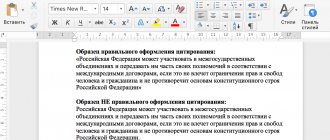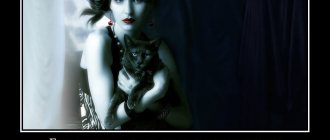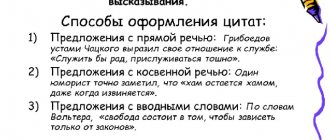What is a quotation
First, let's give a definition:
A quotation is a verbatim excerpt from a text or a repetition of a saying of one of the famous people.
It could be just a couple of words or several sentences at once.
And it serves to reinforce one’s own statements, giving them special significance.
The term QUOTE itself came to us from the Latin language. Literally translated, the word “citata” means “to set in motion, to move .”
Interestingly, this term was originally used in jurisprudence as evidence of correctness. But in literature it began to be used around the 20s of the 19th century, after which the word “quote” ended up in various reference books and dictionaries as “a verbatim excerpt from the text.”
Accuracy
To quote, you need to take a logically complete fragment of text so that the completeness of the quote is sufficient to guarantee its semantic accuracy
.
It is unacceptable to take phrases out of the context of the source when this leads to a distortion of its meaning or at least its semantic shade. Naturally, there can be no question of adjusting the quotation in this way to the needs of the quotator. Shortening a quotation by discarding words that are unnecessary for quoting purposes is permissible only if this cannot change its meaning
.
The quotation cannot be changed; it must correspond exactly to the source. However, in some cases it is possible to correct obvious typos and change the case of words and phrases. Correcting errors and outdated spelling is recommended in cases where it is important to convey the meaning of the text
.
If we are talking about reflecting the author's style
, then text correction is unacceptable even for obvious errors.
When quoting, you can omit one or more words or even sentences, if this does not distort the meaning of the text and if warning signs in the form of ellipses (...) are placed in place of the omitted words or sentences (...) or - when abbreviating a quote that already has ellipses that perform certain functions their inherent functions are ellipses in angle brackets (<…>). If individual words or phrases are quoted, then the ellipsis is usually not used.
Correct spelling of quotes
When using quotes in the text, you can use both direct speech and indirect speech . It will look like this:
Vladimir Lenin said: “Study, study and study” (direct speech) Vladimir Lenin said that everyone needs to “study, study and study” (indirect speech)
Please note that Lenin's words are in quotation marks in both examples. This is another rule for writing quotes. True, it concerns only prose. But when quoting poems, they are simply inserted into the text in the form in which the author has them.
By the way, Internet users often like to use quotes, for example, when writing statuses on social networks. And there is an unspoken rule - put a © icon .
It means “copyright,” that is, borrowing. It can go on its own or with the name of the author to whom the quote belongs.
Basic citation requirements
- Quoted text must be placed in quotation marks and be identical to the original source. The lexical and grammatical form must fully correspond to the original.
- You cannot combine passages from different sources in one quote. Each statement is presented in the form of a separate quote.
- It is prohibited to enter citations if they occupy 30% of the text volume.
- It is unacceptable to quote authors whose texts are protected by copyright. This mainly applies to scientific papers and research texts.
The emergence of quotes
The main rule of any quote is that it has a very specific author. True, when using this or that expression, we may not remember or even not know who first said it. A striking example is the phrase:
Russian language is great and powerful
We are sure that 9 out of 10 people will not be able to answer who these lines belong to. Meanwhile, this is the great writer Ivan Turgenev and his prose poem “Russian Language,” written in 1882.
True, there this expression looks somewhat different. It was given a modern look in colloquial speech.
In days of doubt and painful thoughts about the fate of my Motherland, only you are my support and support, oh great, mighty, truthful and free Russian language!
The presence of an author is the main difference between quotes and proverbs and sayings. Although both of them are catchphrases that have become firmly entrenched in our lexicon. But the expressions “A woman with a cart, it’s easier for a mare” or “Let the goat into the garden” are not quotes. These are elements of folk art and folklore, and they do not have an author with a specific first and last name.
Punctuation at the end of a quote
Separately, you need to consider the design of a quote in a letter in situations where it is necessary to decide on the punctuation marks at the end of it - before and after the quotation marks.
- If the quoted phrase ends with an ellipsis, question mark or exclamation mark, then they are placed before the quotation marks:
Katharine Hepburn exclaimed: “By obeying all the rules, you deprive yourself of many pleasures!”
- And in a situation where there are no signs before the quotation marks in the quotation, a period is placed at the end of the sentence, but only after them:
Ranevskaya lamented: “85 years with diabetes is not sugar.”
- If the quotation is part of a subordinate clause, then a period should be placed after the quotation marks, even if there is already an exclamation mark, a question mark or an ellipsis before them:
Marlene Dietrich rightly believed that “tenderness is a better proof of love than the most passionate vows...”.
Sources of quotes
- LITERATURE – excerpts from the works of famous writers and poets.
The less we love a woman, the more she likes us (Pushkin) I gave birth to you, I will kill you (Gogol) It’s elementary, Watson (Conan Doyle) - HISTORY – statements of historical figures.
He came, he saw, he conquered (Caesar) Whoever comes to us with a sword will die by the sword (Alexander Nevsky) - CELEBRITIES - as in the previous paragraph, these are statements of famous people, only contemporaries or those who lived in the recent past.
Five minutes - a normal flight (Valentina Tereshkova) Float like a butterfly and sting like a bee (Mohammed Ali) No money, but you hold on (Dmitry Medvedev) - RELIGION – Many catchphrases are borrowed from the scriptures.
God works in mysterious ways - CINEMA - a lot of quotes in our colloquial speech are borrowed from feature films; Soviet films are especially rich in catchphrases.
At 40, life is just beginning (“Moscow doesn’t believe in tears”) Semyon Semenych! (“The Diamond Arm”) Leave me alone, old woman, I’m sad (“Ivan Vasilyevich is changing his profession”) - ADVERTISING – some slogans have successfully migrated from TV screens into our everyday speech.
Don't slow down - Snickersney (Snickers bars) You're still boiling, then we're coming to you. (Ariel washing powder)
And here we must mention one more main rule regarding citation. Phrases must be used literally ! And if in colloquial speech a slight distortion is still allowed (although it is better not to do this), then when writing, the order of words and even punctuation marks should be exactly the same as in the original source.
As the author or source of the quoted passage is indicated
In this article we will not talk about how a bibliographic footnote is formatted, but we will discuss the ways in which the author or source of what is cited is indicated. Good manners require you to do this every time you use someone else's thoughts.
So, if you want to put a link to the source or a mention of the author’s name immediately after the quotation, then they are usually placed in brackets.
“Incompetent people have a tendency to reach categorical and categorical conclusions” (David Dunning).
Please note that in this version there is no period after the quotation; it is placed only after the link! By the way, if the first word in brackets indicating the source is not a proper name, then it is written with a small letter.
“Incompetent people have a tendency to draw unambiguous and categorical conclusions” (from an article by psychologist David Dunning).
If the formatting of quotations in the text requires the name of the author or their source to be placed on another line, then they are written without parentheses or other punctuation marks. And after the quote itself there is a period or any necessary sign.
Incompetent people have a tendency to draw unambiguous and categorical conclusions.
David Dunning
The same rule applies to epigraphs.
Is it lower case or capital letter at the beginning of a quotation?
If a quotation is placed after a colon, then you need to pay attention to what letter it began with in the original source. If it is with a lowercase letter, then the quote is written with a small letter, only an ellipsis is placed before the text:
Describing A.S. Pushkina, I.A. Goncharov emphasized: “...in the gestures accompanying his speech there was the restraint of a secular, well-bred man.”
If the quoted passage begins with a capital letter, then the quotations are formatted in the same way as in direct speech - with a capital letter after the colon.
V. Lakshin wrote about A.N. Ostrovsky: “Many things continue to sound in these plays with living joy and pain, echoing in our soul.”
[edit] Notes
- https://www.business-gazeta.ru/article/323586
| The quote relates to the topics: | |
| InternetCopyright | |
| World Wide Web • Web ( • • 1.5 • • ) • Blogosphere • Ban • Banner • Browser • Web surfing • Video (blogger) • Wikimedia • Images • Internet money • Internet advertising • Crowdsourcing • Online games • Search engine • User • Hosting • As We May Think • DNS • HTTP • FTP • Cookies • CMS • URL • Runet (history) • Webcam • Geolocation • Geotargeting • Loading • Overquoting • Offtopic • IRC • Copy-paste • Cross-system • Online • Disconnection • Offline • Downloading • Subculture • Business • Trade • Competition | |
| Places | Booru • Archive • Blog • Web portal • Web service • Web forum • Video hosting • Wiki • Domain (Subdomain) • Imageboard • Store • News • (media) • Cloud • Answerer • Personal site • Ruwap • Aggregator (products • taxi) • Service • Service provider • Link shortener • Social network • Torrent • Forum • Photo hosting • File sharing • Shocking site • Encyclopedia-lurkmor |
| Famous sites and services | Alexa • Bashorg • Bobrdob • Delicious • Demotivation.me • Dirty.ru • Facebook • Foursquare • FriendFeed † • Google • Instagram • Last.fm • RapidShare • Reddit • Twitter • Webmoney • Wikipedia • VKontakte • LiveJournal • Leprosarium • Lurkomorye • Odnoklassniki • Habrahabr • Yandex • ImageShack • Mister Wong • Sci-Hub • Smi2.ru • TikTok • • Photo hosting Yapix |
| Famous people | Artemy Lebedev • Bill Gates • Brad Fitzpatrick • Vannevar Bush • Jimbo Wales • Julian Assange • Igor Ashmanov • Sergey Brin • Steve Jobs • Mark Zuckerberg • Misha Verbitsky • Larry Page • Pavel Durov • Edward Snowden • 10 most important people on the Internet • 33 promising Russians |
| Representatives | Administrator • Anonymous • Registered participant (Blogger • Wikipedist) • Gamer • Lamer • Moderator (pre-moderation) • Moralfag • Founder • Paid account • Streamer • Follower • Freelancer |
| Basics | Authorization • Account • Virality • Invite • Lulz • Profile • Personal message • Pruflink • Rating • Representativeness • Reputation • Titles • Censorship • Regulation • Correspondence • Site rules • Warning • Smiley (kaomoji) • Blocking a participant • Destructive actions • Internet addiction • Information sovereignty • Meme • Semantic Web • Slang • Trolling • Deletion • Internet community • Views |
| Holidays and dates | New Year • Defender of the Fatherland Day • Women's Day • April Fool's Day • Internet Day • Easter • Victory Day • Knowledge Day • Halloween • National Unity Day • Christmas • Holidays |
| Other | The Great Network • Virtual ethnography (ethnicity) • Worldwide launch of IPv6 • Village Internet • Home Internet • Godwin's Law • Internet archeology • Internet historian • Internet in space • Internetology • History of the Russian Internet • Nostalgia for the past • Rules of the Internet • Projects about history Runet |
| Related | • Voting • • Complaint • Intellectual • Crowdfunding • Mat • Greeting • Cancer • Rating • Sex (virtual) • Bullying • File • Flood • Quotes • iPhone • iPad |
| Research | Perception of creativity in the digital age • Delay in content consumption |
| Copy right? [edit] | |
| Basics | Copyright • Copyleft • Author • Author's article • Authorship (the disease of Wikipedians) • Anti-copyright (subculture) • Fair use • Prohibited number • Computer piracy • Internet pirate • Wikiproject license • Wikiprojects licensing policy • Copyvio • Copypasta (in wikiprojects) • Copyright • Copyrightism • Copyright • Personal copyrights • Multi-author article • Overquoting • Translation • User agreement • Copyright holder • Downloading • Torrent • Quote |
| Licenses | Public domain • Free license • Creative Commons (Creative Commons licenses • text CC-BY-SA 3.0) • GFDL (spam • text v.1.3.) • GPL • WTFPL • Copyright VP USSR |
| Incidents | Ad Marginem vs. Andrey Chernov • Promusicae vs Telefonica • Vedomosti vs. RBC • Valentin Kiselev’s case • Sergei Abramov’s case • Blizzard’s borrowing of ideas from its own clients • Dontsova and Ustinova’s appeal to Yandex • Protection of charts • Perfect 10 trial with Yandex • Durov’s trolling of copyright holders • Threat to shut down the Internet |
| Copyright protection | DRM • RIAA • SOPA • Antipiratbyrån • MediaDefender • Anti-Piracy Law • Strike on YouTube |
| People and projects | Fernrohr • Anti-copyright (wikiproject) • Time to change the copyright • Igor Pugach • Steal This Film • Richard Stallman • Release group (RG Mechanics • Salat Production) • Blackcats-games.net • BitTorrent DNA • RetroShare • BearShare • FreeNet • Fuck You Bill • ICM • Librusec • Flibusta • Sci-Hub |
| Miscellaneous | Copyright on YouTube • SEO trolling • Unknown artist • First author right |







